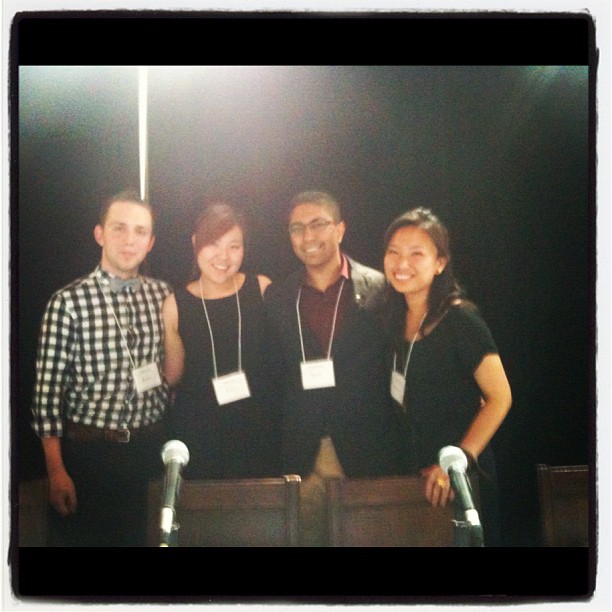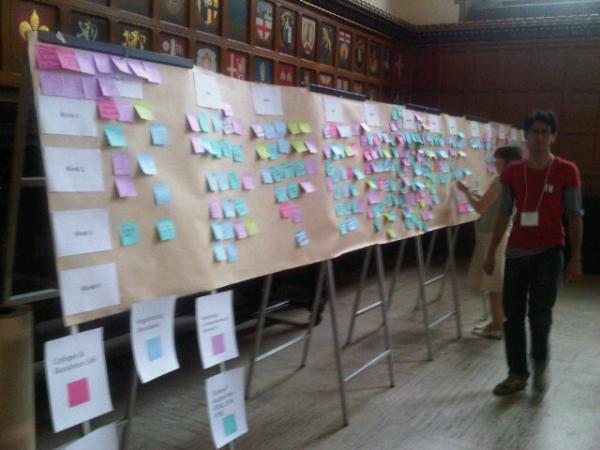Last Friday, I had the opportunity to go back to my alma mater, the University of Toronto, and speak on the panel for their first Communications Summit. The event brought together senior staff responsible for communicating with students, particularly those in their first year at the university. It was an effort to break down the silos between the many different departments and collaboratively create a strategic communications roadmap for the upcoming year. The summit was largely a response to a report released by the Council on Student Experience in July 2010, which found that many students didn't really feel a strong sense of support or community on campus (and as a recent grad, let me tell you...I can attest to that).
"NSSE results indicate [U of T] students perceive the institution as less supportive in meeting their academic and social needs and experience lower quality relationships with staff, faculty and other students than those reported by students at peer institutions." -- In Their Own Words: Understanding the Undergraduate Student Experience at the University of Toronto
I was asked to speak about my work and research with Barry Wellman and Lee Rainie on networked creation and how it relates to the university as well as my own experience as a former student. And as someone working in marketing and communications, it was fascinating to get a behind-the-scenes look at how this all works in the university setting. I'm used to working with smaller, more collaborative and agile businesses and oganizations and it was really interesting to see how bigger, more bureaucratic institutions are dealing with and adapting to (or not) the changing networked media landscape.
 Summit panelists: Theo, Coey, Chirag, and moiOne of the things that really resonated with me on that day was what keynote speaker and marketer, Max Valiquette, noted and that is that universities need to start thinking of themselves as brands. And that means more than just providing a "product"--in this case a public good: education--but also an experience...both online and offline. Many of the most successful businesses provide an experience for its customers (just think Starbucks) and there's no reason that universities should think of themselves as fundamentally different from such companies. The university is a profit-making institution with a very clear "customer". And if anything, universities actually have a leg up over other businesses in that they have direct and complete access to all of their customers. Failing to communicate your message effectively when you have not just all the personal and contact information of your audience (phone, email, schedule, address, birthday...like, actually everything), but also an audience that is actually interested in what you have to say? Well, that's almost unforgiveable.
Summit panelists: Theo, Coey, Chirag, and moiOne of the things that really resonated with me on that day was what keynote speaker and marketer, Max Valiquette, noted and that is that universities need to start thinking of themselves as brands. And that means more than just providing a "product"--in this case a public good: education--but also an experience...both online and offline. Many of the most successful businesses provide an experience for its customers (just think Starbucks) and there's no reason that universities should think of themselves as fundamentally different from such companies. The university is a profit-making institution with a very clear "customer". And if anything, universities actually have a leg up over other businesses in that they have direct and complete access to all of their customers. Failing to communicate your message effectively when you have not just all the personal and contact information of your audience (phone, email, schedule, address, birthday...like, actually everything), but also an audience that is actually interested in what you have to say? Well, that's almost unforgiveable.
Throughout the day, there were so many questions as to which communication platform was the best to reach out to the student population. Was it Facebook? Twitter? Email? And if it was email, did students prefer long messages that outlined everything or shorter notes with links for more information? Valiquette said something akin to email being dead and irrelevant, but some students in attendance indicated otherwise saying that they actually preferred email as their primary mode of communication. Conflicting answers that didn't really give the staff much to work with.
The problem here is that many of the staff members at U of T are approaching this with assumptions about students and the way they receive their information. But after talking to many of them, I discovered that none of those assumptions were actually being tested and confirmed. No one was looking at the data. Instead of running blindly with these assumptions, why not test them and learn with empirical data whether or not those assumptions are actually true? For instance, what are the open rates and click through rates of their emails? Which platforms were the largest referrers to their site? Looking at this concrete, empirical evidence would give better answers to their questions of which communication platforms are the most effective. Imagine all the time, money, and effort that could be saved if time was spent looking at this data and iterating properly.

It's a huge undertaking but there are universities (Harvard, for instance) that are really keeping up with the times and communicating in ways that truly resonates with its students. The student population is one of the most natural communities out there and it's a very social demographic that is eager to participate in this networked world. I know it's easier said than done but U of T needs to start thinking more like a startup and experiment, test and retest, and iterate quickly (rinse and repeat!). They need to hack their own institution and disrupt their traditional and bureaucratic structure and create a space for innovation and collaboration. Failing to do so may mean the risk of becoming those archaic, irrelevant ivory towers that universities are so often accused of. And as a proud alumni, I sure hope that won't be the case!
Check out my storify for some of the conversation taking place online during the event.

